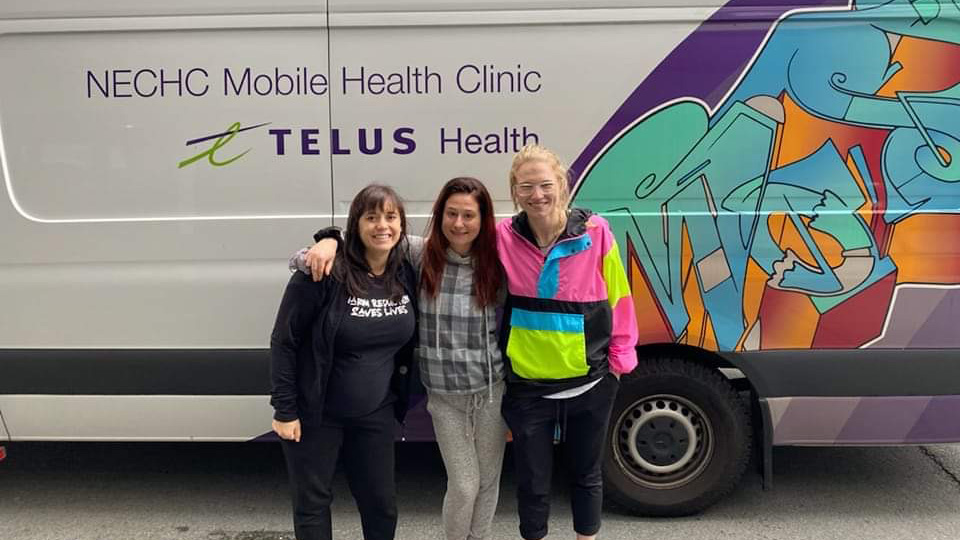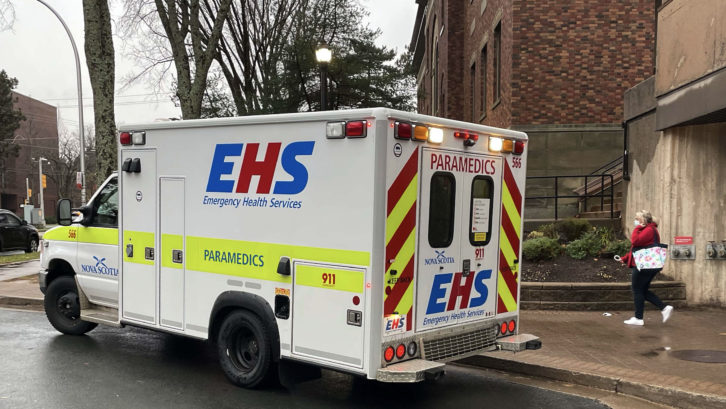COVID-19 pandemic contributes to increase in 911 calls for overdoses
Statistics show emergency calls for overdose up 73 per cent across Canada in two years

caption
Members of Substance User Network of the Atlantic Region stand in front of the Mobile Health Clinic van. From left to right: Jill Harnum, Katie Upham and Emily Wadden.Harm reduction educator Katie Upham says the effects of COVID-19 are driving a rise in overdoses in Nova Scotia.
“COVID absolutely exacerbated a problem that already existed,” said Upham, who works with the Substance User Network of the Atlantic Region.
Upham describes herself as someone with lived experience, meaning she has “experience using substances in the past.”
“There are many people that I know who had been abstinent from using and then the pandemic hit and maybe they lost their job or are feeling more isolated from friends and family and that can trigger somebody to go back to using substances,” she said. Related stories
“Especially if they cannot access services and resources, which we have a lack of, to manage their substance use disorder.”
The conditions of the pandemic created an isolating environment that affects people who use substances, Upham said.
New data from Statistics Canada affirm Upham’s observations.
The data released earlier this month show that between August 2019 and August 2021, the number of emergency calls across the country for overdose increased by 73 per cent.
In August 2019, there were 413 calls to 911 for overdoses. The number of calls reached the highest point in July 2021 with 762 calls, coming down slightly in the next month with 714 calls.
According to public Nova Scotia data, there were 56 probable or confirmed deaths in the province related to drug toxicity in 2019, and 50 in 2020. As of Nov. 5, the province has recorded 33 probable or confirmed deaths related to drug toxicity in 2021.
Dr. David Martell, physician lead for addiction medicine for Nova Scotia Health, said that lockdowns during COVID-19 played a role in increasing substance use.
“People are more isolated; they can’t connect with each other and that feeds the disease,” he said.
“I would expect that a situation like a lockdown or quarantine or even public health measures that involve social distancing would create more trouble for a person who already has either a tendency for or an established substance use disorder.”
Safe supply of opioids has also been a concern during the pandemic.
“And very often when we see overdoses, both fatal and non-fatal, it isn’t just one substance involved, it’s usually several. And fentanyl is still at the heart of those overdoses,” Martell said.

caption
An EHS ambulance is parked near a hospital in Halifax on Nov. 18.Martell explained that there is no single profile of a person who uses substances.
“Substance use disorders happen in people who have very substantial poverty and housing issues, but they also happen in people who are employed,” he said.
Janelle Comeau, health services manager for Nova Scotia Health, said there are some services offered for those dealing with substance use. A person is referred to services on a case by case basis.
“It really depends on what the major presenting problems are that the person is calling us with and how badly those major presenting problems are impacting their activities of daily living,” she said.
Services include support groups, inpatient and outpatient withdrawal management services, naloxone programs and opioid replacement therapy.
Comeau said Nova Scotia Health is experiencing an influx in referrals in mental health and addiction due to the pandemic.

